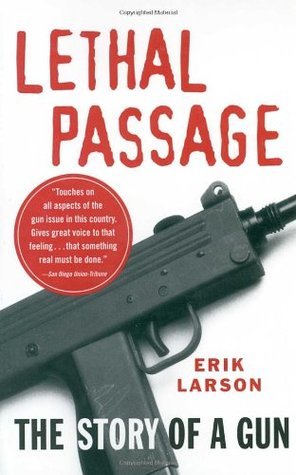In non-fiction literature, few authors can transport readers into the depths of history with as much precision and narrative flair as Erik Larson. Renowned for his meticulous research and captivating storytelling, Larson has carved a niche in historical non-fiction. One of his lesser-known yet equally powerful works is "Lethal Passage: The Story of a Gun," a compelling exploration into the intricate web of America's gun culture.
Published in 1994, "Lethal Passage" delves into the controversial topic of gun violence through the lens of one particular firearm: a .38 calibre revolver. Larson's narrative is centred around the journey of this handgun from its creation to its eventual use in a fatal shooting. Through meticulous investigative journalism and vivid storytelling, Larson unpicks the complex tapestry of America's relationship with guns, exposing the multifaceted factors that contribute to the epidemic of gun violence in the country.
One of the most striking aspects of "Lethal Passage" is Larson's ability to humanize all facets of the story. From the gun's manufacturer to the individuals involved in its ownership and eventual use, each character is fleshed out with empathy and understanding. Larson does not seek to vilify or glorify; instead, he presents a nuanced portrayal of the individuals caught in the crossfire of America's gun debate.
Through interviews, historical records, and meticulous research, Larson paints a vivid picture of the cultural, social, and political forces in America's obsession with firearms. He delves into the psychology of gun ownership, exploring the sense of power, security, and identity that firearms provide to their owners. At the same time, he confronts the harsh realities of gun violence, examining the devastating impact it has on individuals, families, and communities across the nation.
"Lethal Passage" is not merely a recounting of events but a call to action. Larson challenges readers to confront the uncomfortable truths about gun culture in America and to engage in meaningful dialogue about how to address the root causes of gun violence. By weaving together personal narratives, historical analysis, and social commentary, Larson creates a thought-provoking narrative that lingers long after turning the final page.
More than two decades after its publication, "Lethal Passage" remains a timely and relevant exploration of one of America's most pressing issues. In an era of heated debates over gun control and Second Amendment rights, Larson's work serves as a poignant reminder of the human cost of inaction. It is a testament to the power of literature to shed light on the darkest corners of society and to inspire meaningful change.
In conclusion, "Lethal Passage" is a testament to Erik Larson's skill as a storyteller and his commitment to uncovering the hidden truths of history. Through his compelling narrative and meticulous research, Larson illuminates the complexities of America's relationship with guns, challenging readers to confront the uncomfortable realities of gun violence in the country. For anyone seeking a deeper understanding of this contentious issue, "Lethal Passage" is essential reading.

